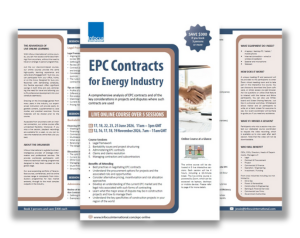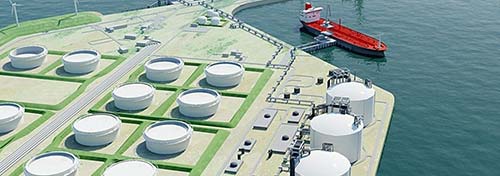EPC Contracts for Energy Industry (Online Course)
WHEN
Option 1: 17, 18, 22, 23, 25 June 2026
Option 2: 12, 16, 17, 18, 19 November 2026
WHERE
Live Online Course
Overview
A comprehensive analysis of EPC contracts and of the key considerations in projects and disputes where such contracts are used
This course provides an in-depth analysis of EPC contracts, their interface with other project documents and their role in the project lifecycle. It discusses key risk allocation issues, and the structuring of the contract in a project financing context. You will be introduced to the key terms and negotiation issues in EPC arrangements, the role and incorporation of technical details, and the impact of project specifications in EPC arrangements.
This course will benefit participants with different levels of experience. For those with no experience, it will provide a basic tool kit of what EPC contracts look like, what are the major terms and perspectives of owners, contractors and lenders, as well as familiarity with what the major areas of dispute may be during the construction phase and how to manage them. For the more experienced, it will be a masterclass on EPC contracts, covering the key commercial and technical issues in the construction market today. The course director has vast experience of EPC contracts and can answer literally any question on the subject.
Benefits of Attending
- Best practices in negotiating EPC contracts
- Understand the procurement options for projects and the associated risks and opportunities
- Consider alternative pricing, incentivisation and risk allocation approaches
- Develop an understanding of the current EPC market and the legal risks associated with such forms of contracting
- Learn what the major areas of dispute may be in construction projects and how to manage them
- Understand the key specificities of construction projects in your region of the world
Live Online Course – How It Works
The structure of our virtual learning program is designed to keep the same levels of engagement and networking as our on-site public courses. Course content is delivered through our easy-to-use online learning platform and is supplemented by case studies and practical exercises.
Like our classroom-based public courses, you will have live interaction with our course facilitators and other participants. Our live online courses are led by our experienced instructors, who will provide you with easily digestible content, using knowledge learned from many years in the industry, during scheduled times. Delegates will receive copies of the course materials electronically.
This course is scheduled to take place over 5 live online sessions using virtual learning technology.
Course Agenda
Session 1: 17 June 2026, 11am – 3pm GMT | 12 November 2026, 7am – 11am GMT
Legal Framework
- Legal Framework of EPC Contracts
- Tips on Contractual Risk Allocation and Mitigation Strategies
Session 2: 18 June 2026, 11am – 3pm GMT | 16 November 2026, 7am – 11am GMT
Bankability Issues and Project Structuring
- Financing EPC Energy Projects and Project Structuring
- Discussion on Split EPC Contracts, EPCM Contracts and Multi-Prime
Session 3: 22 June 2026, 11am – 3pm GMT | 17 November 2026, 7am – 11am GMT
Administering EPC Contracts
- Review of the Contract Manager Role on Major Energy Sector Construction Contracts
- Managing EPC Contracts for Successful Oil, Gas & Power Projects
Session 4: 23 June 2026, 11am – 3pm GMT | 18 November 2026, 7am – 11am GMT
Claims and Claims Resolution
- Developing an Advanced Dispute Resolution Strategy
- Managing Project Delay and Claims
Session 5: 25 June 2026, 11am – 3pm GMT | 19 November 2026, 7am – 11am GMT
Managing Contractors and Subcontractors
- Contract Negotiation and Administration
- Contracting and Subcontracting Strategies to Deliver a Successful EPC Project in the Oil, Gas & Power Industry
- Managing Contractor Relationships for Long-Term Success and Efficiency
Training Methodology
The agenda will combine presented materials with plenty of opportunity for Q&A, interactive discussions, and the use of quantitative models to illustrate key learning points. Current market examples and data are utilised wherever helpful.

Pre-Course Questionnaire
We would like to customise the workshop based on your specific needs. Pre-Course Questionnaire will be sent prior to the workshop for analyse in advance and to be addressed during the course.

Course Certificate
Upon the successful completion of this course, you will receive a Certificate of Completion bearing the signatures from both the Course Director and the Course Organiser. This Certificate will testify your endeavour and serve towards your professional advancement.
Who Will Attend
CEOs, CXOs, Directors, Heads of Departments, Managers of:
- Legal
- Contract & Procurement
- Project
- Commercial & Finance
- Operation / Engineering
- Investment / Funding
From cross industries including, but not limited to:
- Oil & Gas
- Power & Renewables
- Construction & Engineering
- Banking & Financial Services
- Commercial Law Firms
- Government Authorities
You Might Also Be Interested In
Energy Storage (Online Course)
A business-focused assessment of energy storage opportunities, competing solutions and project delivery essentials
Option 1: 6, 7, 12, 13 May 2026
Option 2: 3, 4, 9, 10 December 2026
Mastering Solar Power (Online Course)
Building solar power into clean, modern & flexible power systems
Dates: 29 June – 3 July 2026
Renewable Energy Power Purchase Agreements (Online Course)
Practical models and techniques for analyzing & structuring, drafting, and negotiating Renewable Energy PPAs for bankable green investments in today’s competitive energy markets
Dates: 7, 8, 9, 15, 16 July 2026
Gas & LNG Markets, Contracts and Pricing (Online Course)
A comprehensive all-in-one course addressing all key elements for successful gas & LNG business strategies
Dates: 1, 2, 3, 8, 9, 10, 14, 15 September 2026
Renewable Energy Project Finance & Financial Modelling (Online Course)
Techniques & models for bankable green energy transactions of solar, wind, hydro, biomass & geothermal power investments in today’s competitive energy markets
Dates: 8, 9, 10, 14, 15, 17 September 2026
Power Purchase Agreement (Online Course)
Structuring successful Power Purchase Agreements (PPAs), managing competitive electricity markets & attracting merchant power investments








































